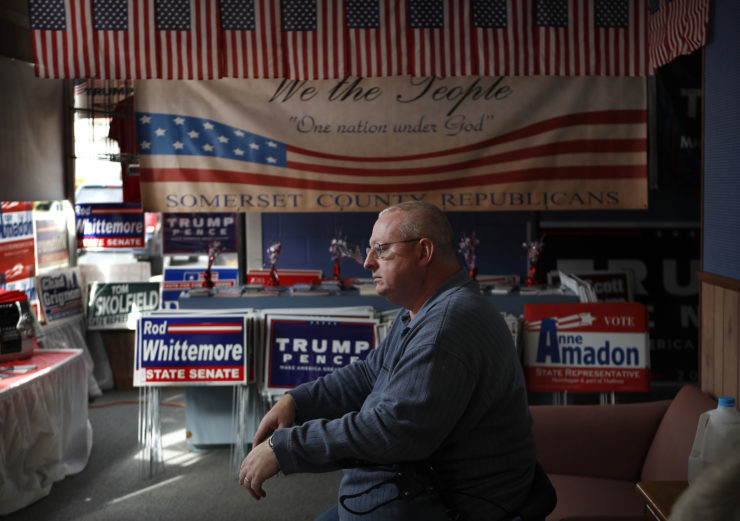As I sat down to write this, I heard a gunshot. Two seconds later, another shot. Two more seconds, another. Then silence.
Six months ago, in Los Angeles, the sound of gunshots would have meant two things: a crime, or a celebration. Today, in Maine, the shots mean one thing: hunting season.
The deer (and moose) season is short; a week in, I’ve learned not to venture into the acres of woods on my land without wearing something bright orange, so I’m not mistaken for something four-legged.
I’m a vegetarian, and my heart lurches when I think of an animal being shot. But I have to accept that there’s so much involved here that’s not about killing. It’s about tradition, it’s about having food for the winter. And yes, it’s about the adrenaline of having such power in your hands.
The election was a bit like that, wasn’t it? This democracy we’re justifiably proud of means we all have power in our hands, even if we don’t always like how others use it.
I spent most of my adult life in an “elite” media bubble. I worked at the Los Angeles Times, about as MSM as you can get. Most of my friends were like me: college-educated, well-read. I lived high up in a canyon where creative types and hippie types and young families with impossibly large salaries looked down on the glittering lights of the massive sprawl below. The chance of a Trump sign in my neighborhood was almost nonexistent.
Now I live in rural Waldo County, in mid-coast Maine. In my town and the ones surrounding it, the Trump signs have outnumbered the Clinton ones by about 9 to 1. (Once when I was driving down a dirt road near my house, I saw a clutch of left-leaning signs at the end of one driveway, all artfully displayed. Then I got to the next driveway and saw a huge piece of plywood with TRUMP spray-painted on it in orange, a large American flag attached, and I thought of the Robert Frost line “Fences make good neighbors.”)
We just had a referendum here that would have mandated background checks for gun sales. In all my months in the Maine countryside, I’ve seen only one sign that supported Question 3. Most of the hundreds of others had this language: DON’T NYC MY MAINE GUN LAWS.
When I read a poll in a newspaper that Question 3 was expected to pass, I was stunned. Could there be that many people in the cities (and I mean cities like Portland, which has 67,000 people, not even the size of many L.A. suburbs)?
It did not pass. The polls, as we have learned this election season, were wrong.
In my time here, I have felt discomfort—and spoken out—as people, in a media bubble of their own, parrot the “Crooked Hillary” line or mutter darkly about immigrants. The governor of this state is Trump-squared, claiming that people of color are coming into Maine intent on turning its men into addicts and impregnating its women; in an insult that may be a bridge too far for even our president-elect, he called an opponent a “socialist cocksucker” and wished he could kill him in a duel.
Yes, Governor LePage is certainly ripe for caricature and deserving of scorn, and this state may be inordinately white, but the danger for the media is to stereotype the people who live here in “flyover land.” I’ve found it’s not a place that can be stuck in a little red-colored box.
Let me tell you about a moment in a local store on Election Day. It was a cheese shop that wouldn’t look out of place in Silver Lake, the hipster L.A. neighborhood. The indie band Beirut was playing on the stereo. The young man who owns the place with his wife was talking to another young man about the cheese he had chosen. Then the customer mentioned that his son had just bagged his first moose. You could tell how proud he was. (A side anecdote. I told another guy shopping there that I was buying some bubbly in case the election went the way I hoped. He replied: “I hope you bought a fifth of something else in case it doesn’t.”)
I had just voted for the first time in my town, population 900. The registrar had handed me a No. 2 pencil and a piece of paper that looked like it had been mimeographed. The curtains on the booths were clearly handmade, with an American flag motif. When I turned in my ballot, a woman who was knitting to pass the time offered me a homemade doughnut. I felt the warmth of kindness and community.
My town turned out to be pale red: 48% for Trump, 42% for Clinton, with a few Libertarian and Green votes thrown in. The state as a whole went for Clinton—and also passed a ballot initiative allowing the use of recreational marijuana. It also, I should point out, approved gay marriage before California did.
I think the test for journalists now will be to capture the real people behind the stereotypes. If they are racists or homophobes, of course call them out on it. But if they are people who just think differently from you—people who enjoy shooting animals, say—don’t belittle them. Engage with them; listen to their stories. This election was about people wanting to be heard. And that’s what we do best.



